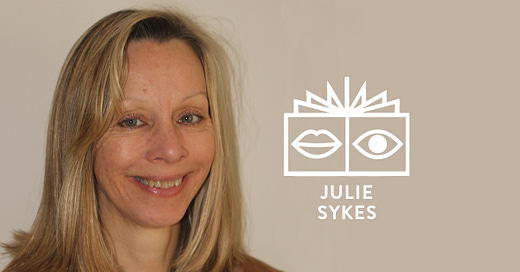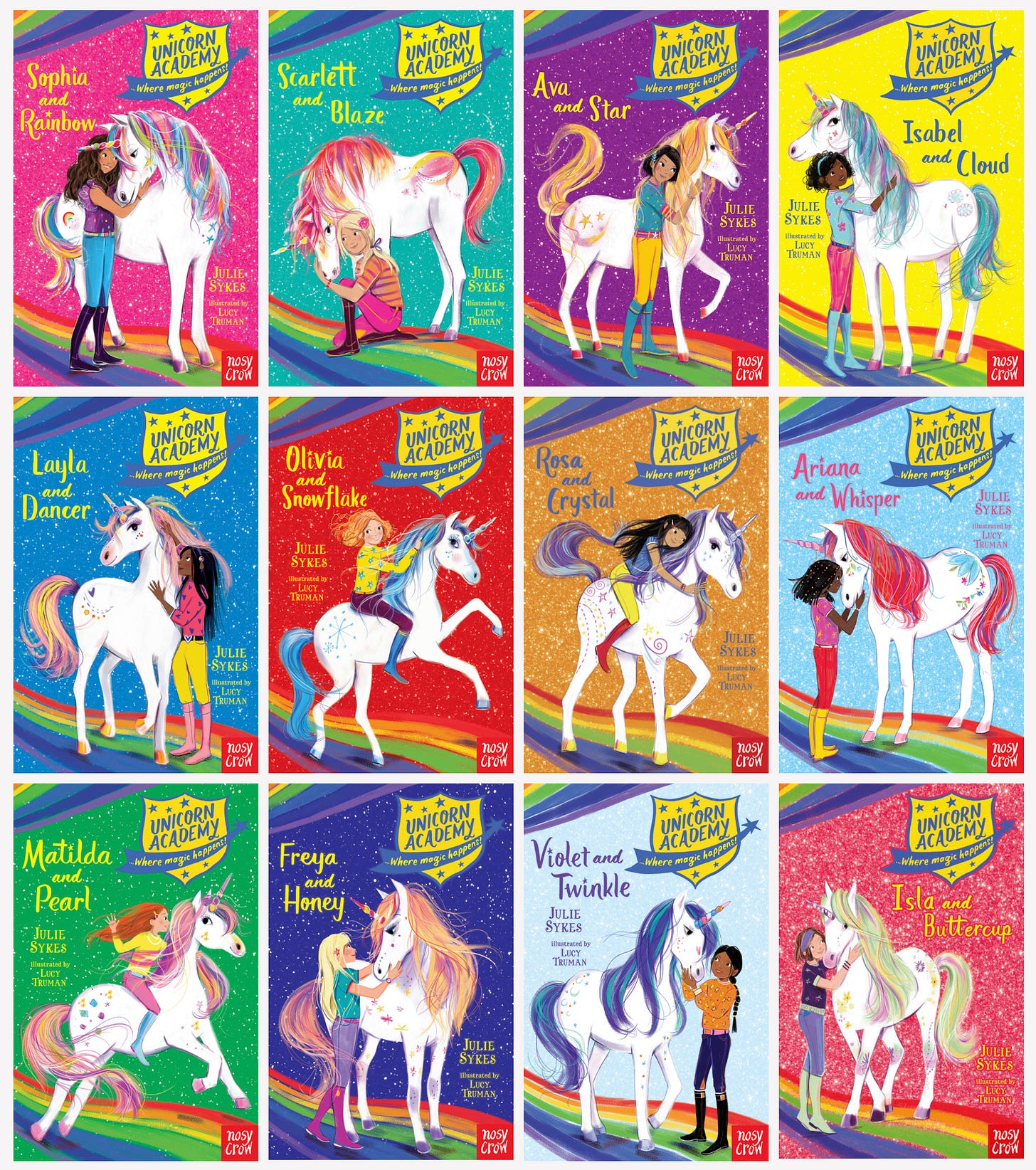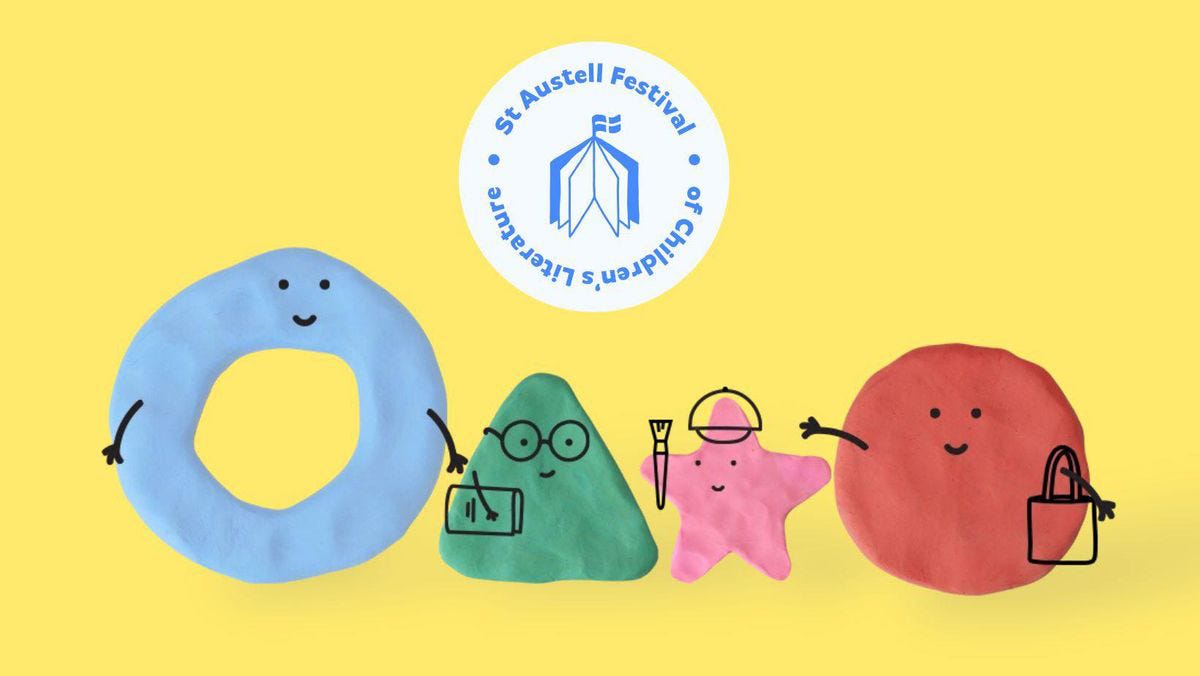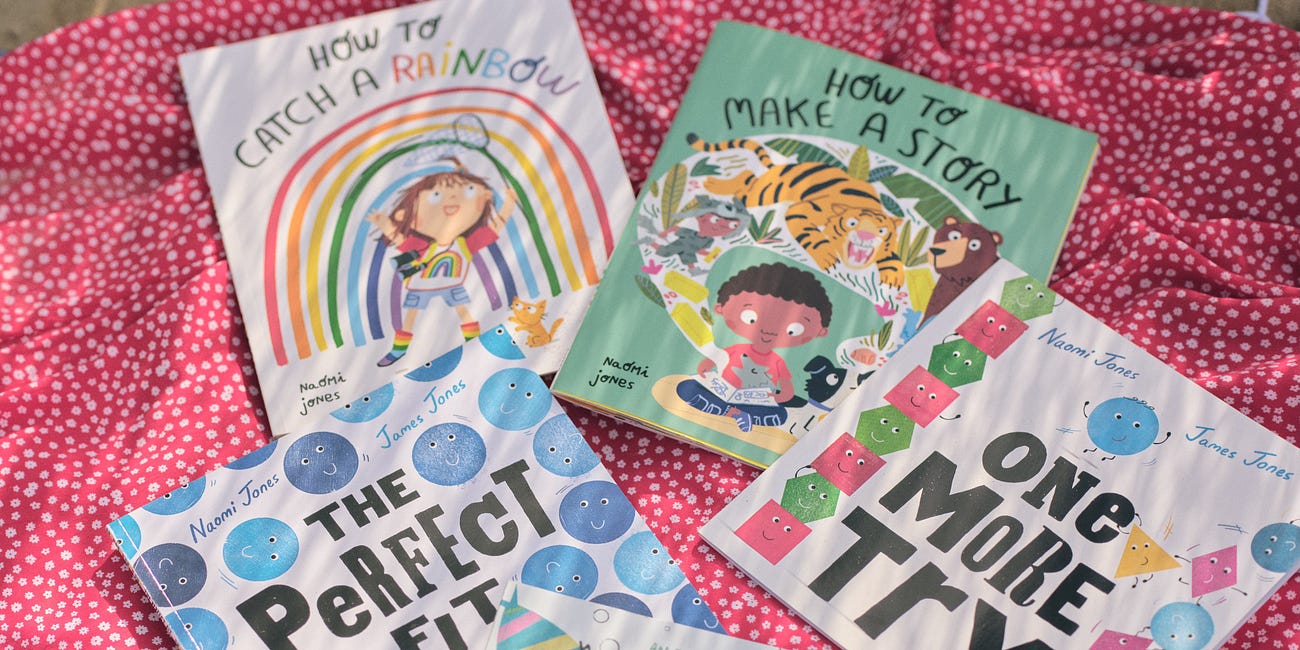Words and Pictures with Julie Sykes
How it felt to see Unicorn Academy become a Netflix show, why you shouldn't ever compare yourself to others and how the children's industry has changed over the last 30 years
This week we’re delighted to share a fascinating interview with you by the bestselling author of over 120 books.
We asked Julie Sykes how it felt to see Unicorn Academy become a Netflix series, her advice for aspiring writers, her involvement with a local literary festival and how the children’s publishing industry has changed over the last 30 years.
Julie Sykes has always enjoyed telling tales. Not the 'she ate all the cake' kind just wildly exaggerated tales of everyday events. Julie still loves telling stories and is the bestselling author of more than 120 books for children published world-wide.
She is also the co-author of the Unicorn Academy series, now streaming on Netflix. Julie lives in Cornwall with her family, two energetic sprollies and a white wolf who cunningly disguises as a dog. When she’s not writing, Julie likes eating cake, flying on her magic carpet, walking and reading.
Why are words and pictures important to you?
Reading is a form of escapism and it allows me to take part in the kind of adventures that I probably wouldn’t be brave enough to go on for real. Pictures are part of that journey. There are so many talented illustrators whose work enriches the text. Often the colours and tiny details are exquisite and I can spend ages looking at the art work.
Why did you start writing for children?
I love reading and I love writing so it was only natural that I’d want to write my own books one day.
Is writing your full-time job? Has it always been your full-time job or have you done any other work alongside it?
Writing is my full-time job and has been for over 30 years. Before that I’ve had a variety of jobs, including voluntary and part time ones especially as a student. I’ve worked in a kennels, shops, bars, a mushroom farm and a glue factory. I also trained as a teacher and taught in schools for many years before I escaped to become a writer.
You've now had over 100 books published. Has the industry changed at all during the 30 years you've been published and if so, how?
The industry has changed a lot both in the way it works and the type of books now published. There is much more variety and diversity than when I first started writing and since authors and illustrators have to work harder to keep the modern child’s attention, the stories are faster paced. In terms of writing and producing a book, I could give you hundreds of examples but here’s one.
My first book was written on an Amstrad, a word processor now most commonly found in museums! Every day, I would load up the software on to my machine to enable me to type and then have to save my work on an external disc.
Back then, manuscripts and editorial feedback was sent by post. If an editor wanted to reach you more quickly, they would ring you! Hearing the postman call or the phone ring was always the source of great excitement.
Do you have a writing routine? If so, can you tell us about it?
I start my day with a dog walk, often on the beach. At the moment that’s at sunrise and it’s peaceful and very beautiful even in the rain. After that, I have breakfast and then it’s straight to my office. I usually break for a quick coffee at some point in the morning. The timing depends on how well things are going! The length of my day also depends on how much work I have on, the deadlines and how much cake there is!
As well as writing books on your own, you also write some series with writer Linda Chapman. How does writing a book together work and how does the process compare to writing solo?
Writing with Linda is a lot of fun. My favourite part is bouncing ideas off each other. I love the way a spark of an idea suddenly blazes into a magical fire. Once we have an idea, a set of characters and a setting we work out the plots. This involves writing a detailed outline. We take it in turns to write a first draft then the draft goes back and forth between us for editing until we are both happy with it.
Unicorn Academy by you and Linda Chapman is now a series on Netflix - how did it feel seeing your characters brought to life on the screen?
Surreal. There’s no other word to describe it. Spin Master have taken such care with our stories and turned them into something incredible. I don’t have the words to express how thrilled I am with everything they are doing.
You're part of the team behind the St Austell Festival of Children's Literature in Cornwall - why do you think literary festivals are important? How do you balance this volunteer role with writing?
Literary festivals bring people together who love books and the meeting of creative minds and sharing books has to be a good thing. The St Austell Festival of Children Literature in particular, aims to promote reading as something for EVERYONE. Events are kept affordable (£1 per ticket with help for those who need it) making festival events accessible to every family in St Austell and Cornwall.
We also pick our guests to ensure a wide range of genres and interests are covered. Reading is a life skill, and I believe it should be a right and not a luxury. Research has shown that children who read regularly have better life choices. Reading is empowering, it broadens knowledge, fosters empathy and is often the keystone for personal growth and happiness.
The St Austell Festival of Children’s Literature is organised by a close-knit team who rely on the generous support of our volunteers. Everyone gives what they can, when they can and that includes me.
What do you do to creatively recharge?
Sleep! But seriously, I like to visit new places, go on long walks, eat good food, spend time with friends and family and very importantly READ.
What advice do you have for aspiring writers?
Keep writing. Don’t ever compare yourself to anyone else. Your writing journey is yours and yours alone. Read everything. Write regularly. Make friends with like-minded people. Be stubborn and tenacious. Write for the sheer pleasure, and torture, of it and know that even if you only write for yourself then you are still a writer.
A huge thank you to Julie for taking the time to talk to us. You can find out more about her on here website, instagram and Bluesky.
If you’d like to find out more about the St Austell Festival of Children’s Literature, or buy tickets, you can take a look at their website. We also have interviews with Heather and Simon who are also on the festival committee as well as a post all about literary festivals here.
Why subscribe to Words and Pictures?
We’ll share everything we know about making books and how the industry works in a new post exclusively for paid subscribers each Monday.
Every month we’ll hold a live session for community members to ask us anything and everything they want to know about writing, illustrating and getting published. The next live session is Sunday 29th June 8pm GMT.
There will also be free interviews every Friday with authors, illustrators and publishing professionals as they spill the ink about life behind the scenes making books.
Every month we’ll also highlight submission opportunities and exciting new releases in the world of children’s books. While you wait for the June round up, you can check out the May round up below:
Submission opportunities for children's authors and illustrators and industry news
Is it just us or has May flown by? We can’t quite believe that it’s almost June and nearly half way through the year…
Love Naomi and James x









